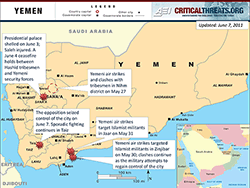 |
The unrest in Yemen has affected the country’s counter-terrorism operations against al Qaeda in the Arabian Peninsula and al Qaeda-linked militant groups. A southern capital is now contested by Islamist militants.
Last Friday, U.S. airstrikes killed al Qaeda in the Arabian Peninsula (AQAP) operative Abu Ali al Harithi and other militants in southern Yemen. U.S. officials reported an increase in intelligence about the locations of AQAP militants, but that there was concern that rival groups would feed information to the U.S. to target others. A senior Pentagon official said that AQAP operatives are embedded with other anti-government militants, making it difficult for the U.S. to execute airstrikes.
The Yemeni military has been unable to regain control of Zinjibar, the capital of Abyan governorate. Reports indicate that hundreds of militants, Yemenis and foreigners, have entered the city. A U.S. official said that the militants did not have control of the governorate, but that “AQAP-affiliated” militants have had success in the capital. The militants reportedly call themselves “Ansar al Sharia” or Supporters of Islamic Law. The Yemeni defense ministry reported that 12 al Qaeda militants had been killed in Doves and Kod regions in Abyan governorate.
Tribesmen control Taiz. Sharaab tribesmen entered the city last week to protect protestors from security forces. An estimated 1,200 tribesmen are in the city and 3,000 are gathered in rural areas outside of the city as reinforcements. The Republican Guard and other security forces have regrouped outside of Taiz, likely to attempt to recapture control.
Yemen’s power vacuum has led groups to seize control of cities and increases the likelihood of state fragmentation. The country also remains at risk of a renewed armed conflict.
If you would like to receive these updates by email, please sign up here.
